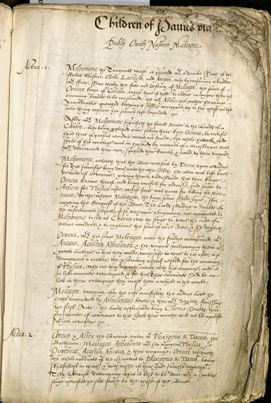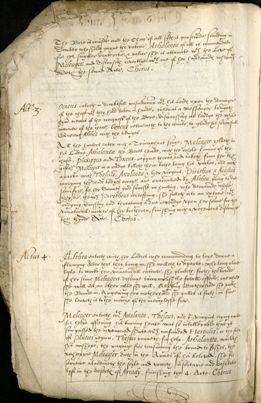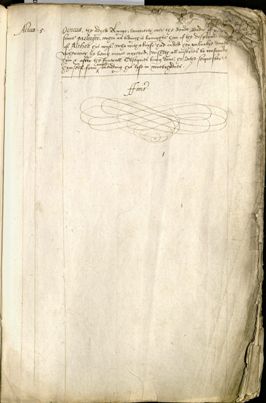Meleager, Publii Ovidii Nasonis
Historical Records
Argument (Houghton Library, MS Eng 1285)
The Meleager argument is found in a manuscript titled "A Register of all the noble men of England sithence the Conqueste Created" (Houghton Library, MS Eng 1285). The argument appears on ff. 3-4, before the chronological "Register" itself actually begins. The top outer corners of the leaves are frayed, rendering the text of the argument defective at a few places.

|

|

|
| Houghton Library MS Eng 1285, f.3r | Houghton Library MS Eng 1285, f.3v | Houghton Library MS Eng 1285, f.4r |
"Register of all the noble men of England" (MS Eng 1285, Houghton Library, Harvard); reproduced by permission.
Transcription
The transcription below is based on Freeman's (126-28), with some minor corrections throughout.
| Children of Paules pla[y] | ||
| Publij Ouidij Nasonis Meleager./ | ||
| Actus. | 1. | Melpomene the Tragicall muse, is prsented wth a dumbe showe of the ffatal Sisters, Clotho, Lachesis, and Atropos, who by consuming a bronde wth ffier, showe therby the fate and desteney of Meleager, the sonne of Oeneus, kinge of Calidon, whose tyme of lyffe to endure no longer then the burnning bronde to be consumed: the wch Althea his mother hearinge ymmediatelie quenched keeping it safflie wrapped vp in her chest as the onlie thing wheron her sonnes lyfe depended w./ |
| After wch Melpomene signifieth the fatall decree to the Lordes of Calidon, who being perplexed ruñe seeking their king Oeneus, to certifie hym that if present remedie weare not founde, the whole havock and spoile of his countrye was in hazard, by meanes of a Monsterous Bore wch devowered their men, spoyled their Cornes, & rooted vp their vinyardes. | ||
| Melpomene, relateth that the Bore was sent by Diana vpon revendge for that sacrifize being done vnto the other Godes, her alter was lefte bare, Devoide of reverence, geving them to vnderstande that their kinge Oeneus knewe therof, and being carefull for redresse, had sente to Athens for Thesius ayde, whose fame was great for killing the Minotaure, withe whome Meleager, the kinges sonne sholde Joyne, ffor achyving the Conquest of the Bore, The Lordes standing in doubte of the infortunate sequell, of so vnhappie a beginning, are appoynted by Melpomene to sitt as Chorus over the stage to vewe the ende of euerie accident, & to explaine the some of euerie Acte, & she departeth. / | ||
| Oeneus, wth his sonne Meleager enter the stadge accompanied wth Ancæus, Acastus, Athalanta, & her virgens welcommyng them wth greate curtezie in that they wolde vouchesafe to come to his ayde, in so Daungerous a matter, the prosecuting wherof rested for the comming of Thesius, who ere they departe, entreth with his companye, and is in lyke manner entertayned, & for that, Their wearines shold be no lett in their enterprize they arest them a while in the courte. | ||
| Meleager tarrying, after the rest manifesteth the ardent Love he hathe conceaved by Athalantas bewtie & therwth Departeth finisshing the first Acte./the Lordes afforesaide being Chorus sheweth that for wante of reverence to the Gods their wrathe will not be apeasde wthout revendge &c. /. | ||
| Actus. | 2. | Oeneus & Althe the Queene enter wt Plexippus & Toxeus, her Bretheren, Meleager, Athalanta wth her virgens, Thesius, Pirythous, Acastus, Ancæus, & their companye, Oeneus resigneth the whole conducte of the Hunters to Plexippus & Toxeus, being skyllfullest in chace, & with wishe of their good successe departethe. They lykewise Determyning what is best to be Done wth a hunters songe cherefullye sett forthe to the chase of the Bore. / |
| The Bore is rowsde and the Chace of all sydes is pursewde standing in dowbte who sholde gayne the victorie, Athalanta of all is commended for her singuler dexteritie, & valior she is attaincte wth the Love of Meleager and discorseth covertlye wth one of her handmaides wherwth endeth the seconde Acte, Chorus. | ||
| Act’. | 3. | Oeneus entreth in dowbtfull consultaciōn wth his Lordes vpon the daunger of the chase wch they had taken in hande, whenas a Messenger bringeth hym newes of the conquest of the Bore, discourssing at lardge the whole manner of the chace, Oeneus retourneth to the courte, to glade his sorowfull Queene Althea with the tidinges./ |
| All the hunters enter with a Triumphant songe, Meleager yeldeth to his Ladye Athalanta the Bores heade, with the whole honnor of the chase, Plexippus and Toxeus, repyne therat, and taketh from her the gifte, Meleager in a radge killeth them bothe, being his vncles, and goeth aparte with Thesius, Attalanta & her virgens, Pirithus & Acastus carrying the deade bodyes awaye, are encountred by Althea, going to doe sacrifyze, for her Sonnes good successe in hunting, who demaundes whose they be, the wch Pirithous certefying, she falleth into an extacie wth radging, Curssing, and threatning a due revendge vpon her sonne for the vnnaturall morther of her bretheren, finishing with a vehement discourse the thyrde Acte. Chorus./ | ||
| Actus. | 4. | Althea entreth with her Ladies who commaunding to laye Downe a flamyng Alter that they bring in, she willeth to departe, who being alone lefte to worke her vnnaturall entente, she plucketh forthe the bronde of her sonne Meleagers Destenye t'accomplish the fatall effecte, one while she will not, an other while she will, Alle[d]ging Brotherhoode she puttes the Bronde in, Argewing her motherhoode she pulles it forth, in fine she leaveth it to the mercye of the mercylesse fier. |
| Meleager entreth wth Attalanta, Theseus, and ye virgins crying owte for helpe affirming his burning heate was so intollerable that yt surpassed the invenomed shirte wch confounded Hercules, or the fier of Plutoes region, Thesius runneth for help, Athalantta, waileth his mishape, the raginge fier consuming the brond to Ashes, the vnhappie Meleager dieth in the Armes of his beloved. she for sorrowe abandoneth the soyle and voweth a solitarie and desolate lyf in the desertes of Arcady. finishing the 4. Acte. Chorus | ||
| Actus. | 5. | Oeneus, the adged Kinge, lamenteth over the Deade Bodie of h[is] sonne Meleager, when as tidinges is broughte him of the desperate [?end] of Althea his wyf, who with a knyfe had ended her vnluckye Dayes Wherwith he being more agreved, wisheth all miseries to confounde hym & after the funerall Obsequies being done, he dothe sequester hymself from courte, Leading his lyfe in wretchednes./ |
| ffinis. |
Theatrical Provenance
Planned for performance by the Children of Paul's. On the question of whether or not a performance took place—or indeed whether or not the play was even written—see Critical Commentary below.
Probable Genre(s)
Tragedy (Harbage).
Possible Narrative and Dramatic Sources or Analogues
As explicated by the argument's heading, the playwright's chief source was Ovid's Metamorphoses (8.270-546). Golding's complete English translation appeared in 1567, although the title implies that the playwright's source was the original Latin. The argument does not significantly deviate from Ovid's narrative, although some material is omitted (e.g. the elaborate hunt scene, which may have been reported in characters' speeches) or rearranged (in Ovid, the firebrand first appears at the end of the story). The same story was also dramatized by William Gager, first performed in 1582.
References to the Play
None known.
Critical Commentary
Dobell, who acquired the manuscript, assumed that the play was performed by the Children of Paul's and that it was written in English. Noting its classical structure and subject matter, he regretted the loss of the play itself "since so few plays of the time constructed on the classical model have come down to us."
Chambers followed Dobell in assuming that the existence of the argument implies that a performance did in fact take place, "probably before 1590" (ES, 2:18).
Freeman provides the most comprehensive survey of the argument. He offers a detailed description of the manuscript and its different hands; his conjectures about the Meleager argument's date; and his case for understanding the argument as a proposal by a prospective playwright to the company. Freeman's limits for dating the argument are 1572 (based on a date recorded elsewhere in the manuscript) and 1590, after which the Children of Paul's disappear from the extant records. In Freeman's analysis, the argument is more likely to be an author's proposal than an audience member's summary: its "manner of description is surely more imaginative than observational" with an exclusive focus on narrative and "inattention to visual detail" (129). Moreover it seems to be the work of an amateur, oblivious to logistical concerns of doubling while prescribing nearly impracticable pyrotechnics (129). On the other hand, the author's selective adaptation of Ovid does reveal a certain awareness about the story's stageable moments. At the very least, the argument "does tell us something about taste, or the expectation of taste, at a certain date, about what characteristics of staging an intentioned playwright thought possible, and what a literate observer at least imagined a Children of Paul's play ought to resemble" (130).
Gair saw c. 1575 as the most likely dating for the argument. Considering the parallel example of William Percy at the end of the sixteenth century, he argued that the opening of the new Paul's theatre would have occasioned their demand for new plays (82). Unlike Freeman, Gair thought that the "casting demands of Meleager, with its ten main actors and extras, are not unreasonable" (83).
Gurr names Meleager as one of the plays performed by the Children of Paul's between 1575 and 1582, when the choirmaster Sebastian Westcott died (222).
Stern discusses the argument as an example of a plot distributed to those attending the play, "interpreting what is happening theatrically to the watching/reading audience" (70).
Wiggins accepts Freeman's dating limits, but suggests a best-guess date of 1576 (148). Noting that mythological plays performed by the Children of Paul's were more typical of the 1570s, he also observes the argument's requirement for an acting space above the stage (for the Chorus of lords), such as that used by the company when Paul's playhouse opened in 1575. "That event would have enlarged the market for scripts, circumstances in which a would-be dramatist might try his hand at a scenario like this, with the company's theatre and typical repertory as known factors influencing the choice and handling of the material."
For What It's Worth
Content welcome.
Works Cited
Site created and maintained by Misha Teramura, University of Toronto; updated 9 October 2014.